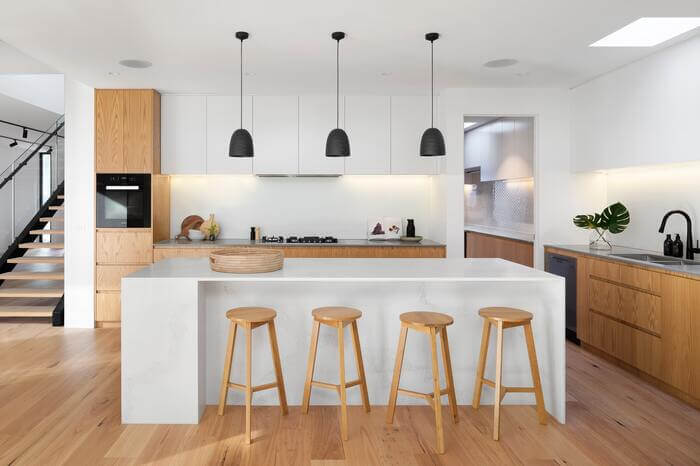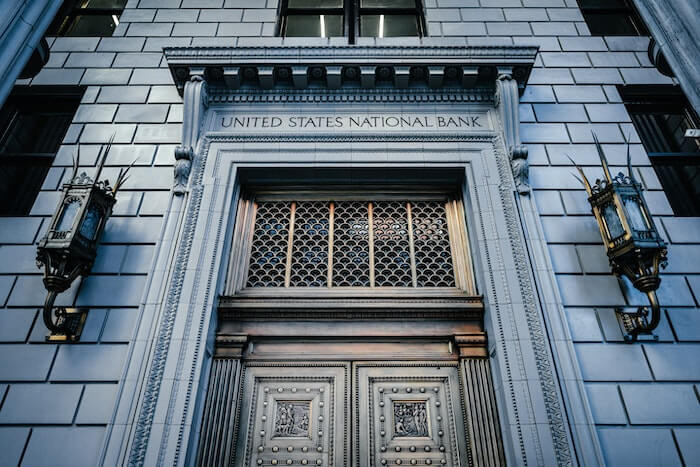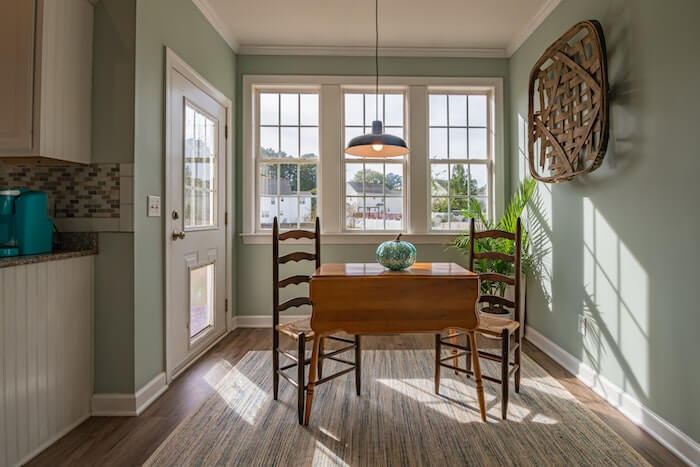An Investor’s Guide to Airbnb Loans and Other Airbnb Financing

The average price for short-term rental properties in the United States is between about $430,000 and $510,000 according to data shared by Optimal Blue and Forbes. Whichever end of the spectrum you are looking to buy at, it is a lot of money. This means that aspiring real estate investors will probably have to seek financing options like Airbnb loans.
That said, with remote work increasing in popularity, applying for a loan to buy a vacation rental property can make sound financial sense. In addition to traditional leisure travelers, big groups, and families, you now also have a new group of travelers that you can welcome at your vacation rental property.
To find out how Airbnb loans work and learn what the main pros and cons of alternative financing options are, continue reading.

What Is an Airbnb Loan?
Airbnb loans are a type of financing created specifically for rental property investors that real estate investors can use to buy a property to rent out on a platform like Airbnb.
The process and terms and conditions will typically be different from a mortgage for a primary residence, and you will likely have to pay a bigger down payment and face higher interest rates.
Is an Airbnb Loan the Same as a Mortgage Loan?
The main difference between an Airbnb loan and a more conventional loan like a mortgage loan is that an Airbnb loan is typically used to buy a second property like an Airbnb property. On the other hand, a mortgage loan is awarded to buy a property that will serve as the primary residence of the borrower. Airbnb loans are classified as investment property loans rather than a home equity loan.
It is generally more difficult to get an Airbnb loan than a mortgage loan. The main reason for this is that there are more risks involved when managing an investment property like a vacation rental. Even more so if it will be your second property and you won’t live on-site.
For example, if your occupancy levels drop, your cash flow will be impacted which could put you at risk of missing a monthly loan payment on your Airbnb property. There is also the possibility that renters can damage your investment property and impact your rental income.

Also, if you do not have a proven record of managing vacation rentals, you will also most likely find it more challenging to apply successfully for a loan. Banks will be hesitant to award a loan for an investment property to someone who seemingly has no experience in managing an Airbnb property business of this kind. This could mean a less stable rental income.

How Do I Get an Airbnb Loan for my Airbnb Property?
Before you apply for an Airbnb loan for short-term rentals, you will need to make sure that you have all your ducks in a row. Ensure that you have your finances ready and that you have put in place a well-thought-out plan for your new Airbnb property investment. The answers that you will need to have are:
- How much money can you contribute to the deal?
- What sources of income do you have that you can use to cover the monthly mortgage payments of your Airbnb loan?
- What is your credit score?

- Pros of an Airbnb Loan
- Lenders that offer an Airbnb loan know how to evaluate a vacation rental property’s viability.
- The loan terms are usually flexible.
- The interest rates are typically fixed and low.
- Cons of an Airbnb Loan
- It’s usually available for only traditional types of properties like single-family residences or a condo.
- Some lenders are strict about the location which means that it might not be available for properties in all states.
- The required credit score might be higher (some lenders require a borrower’s credit score of at least 680).
- The down payment might be higher (some lenders call for a minimum down payment of 20%).
Alternative Investment Property Financing Options For Airbnb Rental Property
If you do not qualify for an Airbnb loan, rest assured that it is not necessarily the end of the road for you. There are several other options available and, as a matter of fact, some options do not require hosts to buy a property at all.
- Home Equity Loan / Second Mortgage For Investment Properties
A home equity loan (also referred to as a second mortgage) can give you a lump sum of money that is based on the amount of equity in your main home. You will then need to make monthly payments over the course of a set term.
Pros
- It can help you to get access to an asset when it is “protected” by a mortgage.
- You can usually borrow up to 85% of the value of your home minus the balance of your mortgage.
Cons
- Your current home needs to boast a high market value.
- There is a risk of foreclosure as your primary home is kept as collateral.
- The interest rate is typically higher than it would be for a cash-out refinance.

- Home Equity Line of Credit
A home equity line of credit (or simply called HELOC) is similar to home equity loans. Though, instead of getting a lump sum cash amount, you will be able to access a line of credit that you can then use as a down payment.
Pros
- During the draw period (which can generally be up to 10 years), you have to make only interest payments.
- There are few restrictions on how you use your credit line.
Cons
- After the draw period has come to an end, you will no longer be able to borrow against your line of credit.
- You might have to pay yearly fees for maintenance and membership.
- You require a credit score of at least 620.

- Cash-out Refinance
With this option, Airbnb hosts can use their proof of income from Airbnb and other rental property platforms to refinance their application. This way, it will essentially replace a current mortgage with a new one.
Pros
- The repayment period is generally longer.
- You might enjoy potential tax benefits.
Cons
- Not all lenders make it possible for Airbnb hosts to use their Airbnb earnings as a way to verify their income.
- You need a credit score of at least 620.
- It is usually limited to 80% of the value of your home.

- Hard Money Loan
Hard money loans are a type of short-term loan that is granted by a private lender and is usually awarded for investments.
Pros
- It can help you to purchase non-conventional types of properties like a treehouse that a traditional loan won’t approve.
- The approval process is, in some instances, faster.
- Your credit score plays less of a factor.
Cons
- The interest rates are high.
- The repayment period is generally very short.
- The down payment can be as high as 30%.
- Personal Loan:
A personal loan refers to money that you borrow from a bank for a set repayment period. It can be used for various purposes.
Pros
- A personal loan is unsecured which means you do not need collateral like a vehicle.
- The money can be used for basically anything.
Cons
- The interest rates are quite high.
- The repayment period is shorter.

- Owner-Occupied Investment Property Loan
If you have your eye on a property with multiple units, you can apply for this type of loan. The condition is that you will have to live on the premises. In other words, the property should be considered your main residence.
Pros
- The interest rate can be lower.
- The lending terms can be more favorable.
- It can make it easier to manage your property as you will be living on-site.
Cons
- You need to occupy the property for at least 70% of the year.
- You need to work close to the property too if working as a property manager won’t be your full-time job.
- You need to move into the home within a month of the closing.

- Cash Savings
While very few will have enough cash savings at hand to buy a short-term rental property, it remains a viable option for some. Alternatively, you can at least use your cash savings for a larger down payment. Be careful with your down payment amount as you may need to keep the interest rate and personal loans in the future in mind.
Pros
- You can save on interest rates.
- You do not have to waste time waiting for loan approval.
- You do not have to worry about your credit score potentially counting against you.
Cons
- You probably won’t have cash savings left for a rainy day after the sale.

- Rental Arbitrage
If you do not necessarily have your heart set on buying a specific property but simply want to enter the short-term rental industry, you can consider the rental arbitrage approach.
With this method, you will rent out a property with the purpose of subletting it via a vacation rental platform for more than the sum of your rent and other expenses needed to run this type of business.
Pros
- You do not need a lump sum of cash or a credit line available to start your short-term rental business.
- It is less risky.
Cons
- The market conditions can change which can lead to a decrease in booking demand.
- It can be difficult to find landlords who are willing to let you sublet their properties.

Which Is The Best Airbnb Financing Method?
At the end of the day, the answer is actually pretty straightforward — the best Airbnb financing method depends on your unique situation and the type of property you wish to buy.
The best way to go about choosing an option that’s best for you is to weigh up the pros and cons of each to see which financing option you’re most comfortable with.
Airbnb Loan FAQs
1. Is Airbnb income taken into account to qualify for an Airbnb loan?
It depends on the lender. Many lenders do not take into account rental income generated via an existing property, while some do. So, you can find a lender that has created small business loans aimed at Airbnb owners.
In fact, Airbnb has partnered with names like Fannie Mae to make an Airbnb business loan more accessible for investors looking to enter the real estate market. So, better keep those bank statements on hand.
2. Can I use an FHA loan to finance my Airbnb?
It depends, but it is unlikely that you will be able to use a Federal Housing Administration loan (an FHA loan) to finance a short-term rental.
The reason for this is that this type of loan is aimed at single occupancy and primary residences.
What you possibly can do is apply for refinancing. In this case, you will have to refinance your loan as a non-FHA loan and possibly stick to nothing shorter than 30-day stays.

3. Where is the best place to get Airbnb financing?
Your unique situation will determine which place will be the best option for financing your Airbnb property.
Generally speaking, if you plan on buying small property, it would make more sense to target your local bank instead of a big investor first.
To help you identify the best place to get Airbnb financing, you will also need to phone a few investors.
4. How do I make the most of my Airbnb investment?
Buying a new property in the right Airbnb market alone won’t ensure profitability. To maximize earnings and the most from their property purchase, an Airbnb host must focus on the following:
- Use proven marketing strategies
Just like with any other type of business, advertising is key to the success of your Airbnb business.
Not only does it help to ensure that your Airbnb rentals are visible to your target audience, but it also helps to build a reputable vacation rental brand.

- Streamline and automate your property management
Property management is a time-consuming task, but by investing in vacation rental software, you can save many hours per week that you can rather devote to income-generating activities like marketing or looking for your next short-term rental property investment.
A software solution like iGMS can, for example, help with:
- Synchronizing reservations across multiple platforms to eliminate the risk of double bookings
- Organizing messages into a single feed with a unified inbox
- Improving communication with automated templates and triggered messaging
- Creating and coordinating cleaning tasks with live tracking to completion
- Creating your own direct booking website
- Managing direct bookings using a direct booking management toolkit
- Perfect your pricing strategy
Successful Airbnb property owners know that they need to revisit their pricing continuously so that it meets demand. By using a dynamic pricing strategy, you can ensure that your rental properties fulfill their potential and help you to meet your goals so that you can cover your monthly mortgage payments.
However, changing the nightly rate and other fees so that they remain in line with current market fluctuations needs to happen in real-time for optimal effect. So, the best approach is to invest in pricing tools like DPGO, Wheelhouse, PriceLabs, or Beyond that can change it for you automatically.

5. Will I still make a profit while paying off an Airbnb loan?
The profitability of your Airbnb business will depend on a number of factors including the market and local short-term rental regulations.
On average, it can take up to three years for a short-term rental business to become profitable. While this is only an estimate, it is very unlikely that you will see a return in revenue right away. That said, by working hard consistently, owning an Airbnb investment can be profitable.
6. What other costs are involved in running an Airbnb rental?
In addition to your mortgage payments, there are a number of other additional costs involved in running vacation rental properties that you will need to keep in mind. These include:
- Vacation rental insurance
- Operational costs like internet access and marketing costs
- Furnishings like decor, linen, etc.
- Cleaning fees and supplies
- Maintenance
- Taxes like occupancy taxes, self-employment taxes, etc.
- Vacation rental platform service fees
About the Author
Callan Riddles is the Content and Social Media Specialist at iGMS. Callan has a passion for finding new ways to help vacation rental businesses thrive. In her free time, she loves to travel, read, and experience all the new things that life has to offer.





![Your Monthly iGMS Roundup [February 2020]](/content/images/size/w600/wordpress/2020/02/igms-roundup-feb-2020-cover.png)

